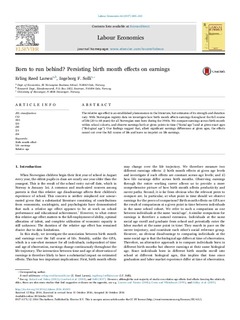| dc.contributor.author | Røed Larsen, Erling | |
| dc.contributor.author | Solli, Ingeborg F. | |
| dc.date.accessioned | 2017-06-19T12:56:05Z | |
| dc.date.available | 2017-06-19T12:56:05Z | |
| dc.date.issued | 2017 | |
| dc.identifier.citation | Labour Economics, 46(2017)June, 200-210 | nb_NO |
| dc.identifier.issn | 0927-5371 | |
| dc.identifier.issn | 1879-1034 | |
| dc.identifier.uri | http://hdl.handle.net/11250/2446391 | |
| dc.description | This article is Open Access available under the terms of Creative Commons Attribution License (CC BY) without permission from Elsevier. Elsevier open access information https://www.elsevier.com/authors/journal-authors/open-access | nb_NO |
| dc.description.abstract | The relative age effect is an established phenomenon in the literature, but estimates of its strength and duration vary. With Norwegian registry data we investigate how birth month affects earnings throughout the full course of life (20 to 68 years) for all Norwegian men born during the 1940s. We compare earnings across birth month within school cohorts, and observe earnings both at given points in time (“Social age”) and at given exact ages (“Biological age”). Our findings suggest that, albeit significant earnings differences at given ages, the effects cancel out over the full course of life and leave no imprint on life earnings. | nb_NO |
| dc.language.iso | eng | nb_NO |
| dc.publisher | Elsevier | nb_NO |
| dc.title | Born to run behind? Persisting birth month effects on earnings | nb_NO |
| dc.type | Journal article | nb_NO |
| dc.type | Peer reviewed | nb_NO |
| dc.source.journal | Labour Economics | nb_NO |
| dc.identifier.doi | https://doi.org/10.1016/j.labeco.2016.10.005 | |
| dc.description.localcode | 2, Hybrid | nb_NO |
